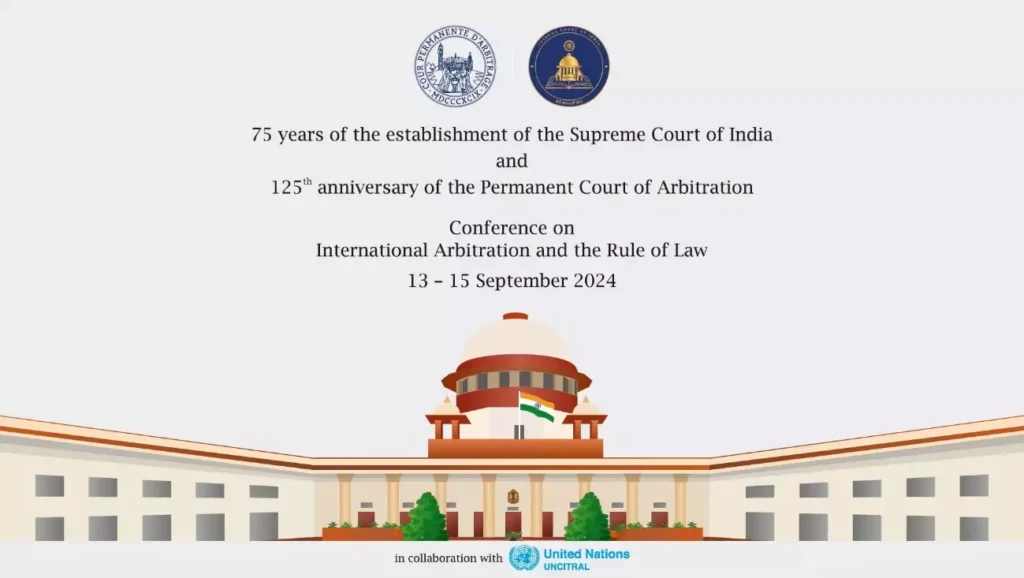The Conference on International Arbitration and the Rule of Law was recently organized to lay emphasis on the importance of arbitration as a key mechanism for dispute resolution.
Role of Arbitration for resolution of disputes:
- The conference, organized by the Supreme Court of India, commemorated the 75th anniversary of the apex court and the 125th anniversary of the Permanent Court of Arbitration (PCA).
- Arbitration is an alternative dispute resolution (ADR) mechanism where parties agree to settle their disputes outside of traditional court systems.
- It is done is through a neutral third party (the arbitrator) who makes a binding decision.
- This process offers a more flexible, cost-effective, and faster resolution to disputes compared to litigation.
- Arbitration aligns with the rule of law by providing a structured, impartial platform for dispute resolution.
- Rule of Law is the principle that all individuals and institutions, including the government, are subject to and accountable under the law, which must be fairly applied and enforced.
- It adheres to international conventions like Geneva Convention and New York Convention.
- This ensures that arbitration awards are enforceable across jurisdictions, increasing their credibility and utility in resolving cross-border disputes.
- Arbitration is often seen as a quicker and more economical option compared to traditional litigation, as it offers parties more control over the process.
- These processes can be appointing their arbitrators, deciding the rules of procedure, and setting timelines.
India and International Commercial Arbitration:
- With globalization, international trade and cross-border business disputes have increased.
- The rule of law is fundamental to India’s democratic framework, ensuring justice, equality, and protection of fundamental rights.
- Arbitration has become a preferred mode for resolving such disputes due to its neutrality, efficiency, and enforceability across borders.
- It can be seen in the collaboration between bodies like the Permanent Court of Arbitration (PCA) and domestic institutions in India.
- India is positioning itself as a center for international arbitration through establishment of the Arbitration Bar of India and the potential opening of a PCA office in Indi.
- It can reduce logistical costs for domestic businesses and enhance accessibility to international arbitration services.
- Training programs and development initiatives for arbitrators and legal professionals strengthen the arbitration ecosystem, to make dispute resolution process more robust and accessible
- The enforceability of arbitration awards are crucial, especially in countries that are signatories to the New York Convention.
- This global recognition ensures that arbitration decisions are binding and enforceable across borders, making it an appealing option for resolving international disputes.
About Permanent Court of Arbitration (PCA):
- It is an Intergovernmental organization established in 1899, headquartered at the Peace Palace in The Hague, Netherlands.
- PCA Provides administrative support for international arbitrations involving states, state entities, international organizations, and private parties.
- It covers a wide range of legal issues, including territorial and maritime boundaries, sovereignty, human rights, international investment, and international and regional trade.
- Unlike a traditional court, the PCA does not have a permanent panel of judges, instead, it assembles ad hoc tribunals for each case.
- This is a significant player in international dispute settlement, offering a neutral and efficient forum for resolving conflicts.
Ref: Source
| UPSC IAS Preparation Resources | |
| Current Affairs Analysis | Topperspedia |
| GS Shots | Simply Explained |
| Daily Flash Cards | Daily Quiz |
Frequently Asked Question:
What is arbitration?
Arbitration is an alternative dispute resolution (ADR) mechanism where parties agree to settle their disputes outside of traditional court systems.It involves a neutral third party, known as the arbitrator, who makes a binding decision on the matter.
How does arbitration differ from traditional litigation?
It provides a structured, impartial platform for resolving disputes, whereas traditional litigation can be more time-consuming and expensive.
What is the Permanent Court of Arbitration (PCA)?
The PCA is an international institution that provides administrative support for resolving disputes involving states, state entities, international organizations, and private parties.
What types of legal issues does the PCA cover?
The PCA handles a wide range of legal issues including territorial and maritime boundaries, sovereignty, human rights, international investment, and international and regional trade.
How does the PCA differ from a traditional court?
Unlike traditional courts, the PCA does not have a permanent panel of judges. Instead, it assembles ad hoc tribunals specifically for each case, drawing from a roster of experts and arbitrators.



